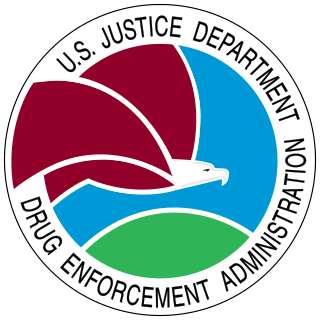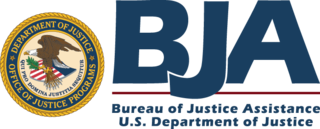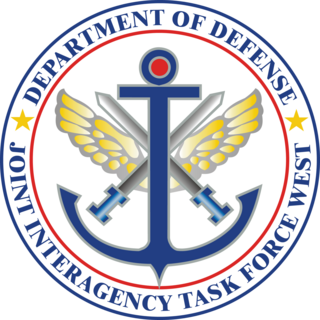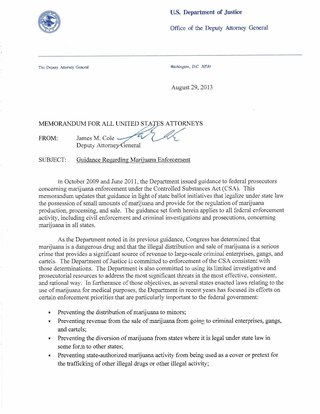
The United States Secret Service is a federal law enforcement agency under the Department of Homeland Security tasked with conducting criminal investigations and providing protection to U.S. political leaders, their families, and visiting heads of state or government. The Secret Service was, until 2003, part of the Department of the Treasury, due to their initial mandate of combating counterfeiting of U.S. currency. The agency has protected U.S. presidents and presidential candidates since 1901.

The Drug Enforcement Administration (DEA) is a United States federal law enforcement agency under the U.S. Department of Justice tasked with combating illicit drug trafficking and distribution within the U.S. It is the lead agency for domestic enforcement of the Controlled Substances Act, sharing concurrent jurisdiction with the Federal Bureau of Investigation and U.S. Customs and Border Protection. The DEA is responsible for coordinating and pursuing U.S. drug investigations both domestically and internationally.

The war on drugs is a global anti-narcotics campaign led by the United States federal government, including drug prohibition, foreign assistance, and military intervention, with the aim of reducing the illegal drug trade in the US. The initiative includes a set of drug policies that are intended to discourage the production, distribution, and consumption of psychoactive drugs that the participating governments, through United Nations treaties, have made illegal.

In Brazil, the Federal Constitution establishes eight law enforcement institutions - seven titulars and one auxiliar. The titular institutions are: the Federal Police, the Federal Highway Police, the Federal Railroad Police, the Federal Penal Police, the State Military Police and Fire Brigade, the State Civil Police and the State Penal Police. Of these, the first four are affiliated to federal authorities and the latter three are subordinated to state governments. These public safety institutions are part of the Executive branch of either federal or state government. Apart from these eight institutions, there are others which affiliate to municipal authorities: the Municipal Guards. According to Minister Alexandre de Moraes of the Supreme Federal Court, "...the Municipal Guards are inserted in public safety as the auxiliary and related body of public security force..." Federal law 13,022 gave them de facto and de jure police attributions.

The Organized Crime Drug Enforcement Task Force (OCDETF) is a federal drug enforcement program in the United States, overseen by the Attorney General and the Department of Justice. The principal mission of the OCDETF program is to identify, disrupt, and dismantle the major drug trafficking operations and tackle related crimes, such as money laundering, tax and weapon violations, and violent crime, and prosecute those primarily responsible for the nation's drug supply.

Transnational organized crime (TOC) is organized crime coordinated across national borders, involving groups or markets of individuals working in more than one country to plan and execute illegal business ventures. In order to achieve their goals, these criminal groups use systematic violence and corruption. Common transnational organized crimes include conveying drugs, conveying arms, trafficking for sex, toxic waste disposal, materials theft and poaching.

The Bureau of Justice Assistance (BJA) is a component of the Office of Justice Programs, within the United States Department of Justice. BJA provides leadership and assistance to local criminal justice programs that improve and reinforce the nation's criminal justice system.

The Anti-Narcotics Force is a federal executive bureau and a paramilitary force of the Government of Pakistan, tasked with combating the narcotics smuggling and use within Pakistan. ANF works under the umbrella of Pakistan Army and Ministry of Narcotics Control (Pakistan) of which Mohsin Raza Naqvi is the minister since March 2024. Due to misconception on Section 4 of ANF ACT 1997, the force's head consisted of the active-duty general officer of Pakistan Army. Although the law prescribes that any competent person may be appointed as Director-General. Currently, a two-star Army Officer, Major general Abdul Moeed is deputed as Director-General. The ANF also has sole responsibility for coordinating and pursuing Pakistan narcotics investigations abroad.

A sanctuary city is a municipality that limits or denies its cooperation with the national government in enforcing immigration law.

Rene Alexander Acosta is an American attorney and politician, who served as the 27th United States Secretary of Labor from 2017 to 2019. President Donald Trump nominated Acosta to be Labor Secretary on February 16, 2017, and he was confirmed by the U.S. Senate on April 27, 2017.
Mexico's law enforcement operates with three distinct powers of authority and jurisdiction: federal, state and municipal. With the recent reform of former president Andres Manuel Lopez Obrador on Mexico's Federal Police, the agency was dissolved due to corruption, links with organized crime and similar issues. A new agency replaced the Federal Police which is the Mexican National Guard.

Joint Interagency Task Force West is a standing United States military joint task force with the mission of combating drug-related transnational organized crime in the Indo-Asia-Pacific. JIATF West's area of responsibility (AOR) is that of United States Indo-Pacific Command (USINDOPACOM). JIATF West is one of two Joint Interagency Task Forces with a counter-narcotics mission. The other is Joint Interagency Task Force South. The task force is run as USINDOPACOM's "executive agent" for counterdrug activities providing support to partner nation law enforcement. Approximately 100 active duty and reserve U.S. military forces; Department of Defense civilian employees; contractors; and U.S. and foreign law enforcement agency personnel are members of the task force.

The Blue Heart Campaign is an international anti-trafficking program started by the United Nations Office on Drugs and Crime (UNODC). Established in 1997, the UNODC supported countries in implementing three UN drug protocols. In 2000, after the UN General Assembly adopted the Protocol to Prevent, Suppress and Punish Trafficking in Persons, the UNODC became the “guardian” of that protocol and assumed the functions of fighting against human trafficking. The Blue Heart Campaign was launched in March 2009 by the Executive Director of the UNODC, Antonio Maria Costa, during his address to the World's Women's Conference meeting in Vienna. The campaign's symbol is a blue heart. The Blue Heart Campaign uses its website, as well as Facebook, Twitter, YouTube, and Flickr to communicate goals, objectives, and news with the public.

The militarization of police is the use of military equipment and tactics by law enforcement officers. This includes the use of armored personnel carriers (APCs), assault rifles, submachine guns, flashbang grenades, sniper rifles, and SWAT teams. The militarization of law enforcement is also associated with intelligence agency–style information gathering aimed at the public and political activists and with a more aggressive style of law enforcement. Criminal justice professor Peter Kraska has defined militarization of police as "the process whereby civilian police increasingly draw from, and pattern themselves around, the tenets of militarism and the military model".

Aviation Drug-Trafficking Control Act of 1984 is a United States Federal law amending the Federal Aviation Act of 1958. The statutory law authorized criminal penalties for the unlawful aerial transportation of controlled substances. The Act of Congress mandated the revocation of aircraft registrations and airman certificates by the Federal Aviation Administration whereas an aircraft aviator knowingly engages in the transit of illicitly used drugs. The Act established authority and a statute of limitations for the reissuance of airman certificates by the United States Secretary of Transportation.

Executive Order 13768 titled Enhancing Public Safety in the Interior of the United States was signed by U.S. President Donald Trump on January 25, 2017. The order stated that "sanctuary jurisdictions" including sanctuary cities that refused to comply with immigration enforcement measures would not be "eligible to receive Federal grants, except as deemed necessary for law enforcement purposes" by the U.S. Attorney General or Secretary of Homeland Security.

The Cole Memorandum was a United States Department of Justice memorandum issued August 29, 2013, by United States Deputy Attorney General James M. Cole during the presidency of Barack Obama. The memorandum, sent to all United States Attorneys, governed federal prosecution of offenses related to marijuana. The memo stated that given its limited resources, the Justice Department would not enforce federal marijuana prohibition in states that "enacted laws legalizing marijuana in some form and ... implemented strong and effective regulatory and enforcement systems to control the cultivation, distribution, sale, and possession of marijuana," except where a lack of federal enforcement would undermine federal priorities.

Erica Hinkle MacDonald is an American lawyer who served as the United States Attorney for the District of Minnesota from 2018 to 2021. She served as a judge of the District Court for the First Judicial District of the State of Minnesota from 2010 to 2018; as an Assistant United States Attorney from 2000 to 2009; a litigation associate in 2000; and a federal judicial law clerk from 1997 to 1999.

Uttam Anthony Singh Dhillon is an American attorney and law enforcement official who served as Acting Administrator of the Drug Enforcement Administration from July 2, 2018, to May 18, 2020. He is married to Janet Dhillon, a former commissioner of the Equal Employment Opportunity Commission.
The social policy of the Joe Biden administration is intended to improve racial equity, increase access to safe and legal abortions, tighten restrictions on gun sales, among other aims. A number of policies aim to reverse the former policies of President Donald Trump, including the "Muslim" travel ban and loosened anti-discriminatory policies relating to LGBT people.



















